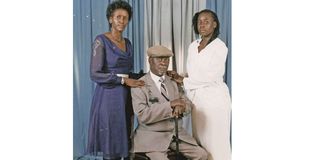Political party names influence national narrative

Jaramogi Oginga Odinga with daughters Wenwa and Ruth.
What you need to know:
- Many freedom fighters continued to languish in poverty as squatters.
- The political class wanted peace so desperately in order for them to continue with business as usual.
- Equal rights—equality in ownership of property, of human rights—and justice, are the foundation and the source of peace.
Since Kenya flagged independence, as the former Vice-President Jaramogi Oginga Odinga referred to the 1963 coronation, the political parties are named in a predictable pattern, and for a reason.
The independence party was named Kenya African National Union (KANU). It invoked the spirit of unity amongst the Kenyan-Africans, who had been fighting to restore their freedom that had been seized by the brutish British colonisers. When it was time to call a truce, the freedom fighters were advised by the colonial masters that it was a time to unite; to not allow the efforts of the struggle for independence disunite us. They obliged, with the hope of regaining their land, and self-rule. Peace prevailed, but justice didn’t.
Land issue
The second president came to power with the promise that he would follow the footsteps, the nyayo, of his predecessor. Hence his moniker, “Nyayo.” He would uphold the call for peace and unity, and, conveniently omitting efforts to find justice. For the twenty-four years that he was president, and KANU was in power, the original owners of the land that had been taken forcefully by the white colonial masters and shared amongst their home guards and collaborators was not evenly distributed. Land became a great issue of contention, not only because displaced people were fighting to regain their roots, but also because it was an identity that the Africans were willing to give up their lives for. There wasn’t hope that was forthcoming. Many freedom fighters continued to languish in poverty as squatters, while others, like the first President Jomo Kenyatta’s family, and that of President Moi, enjoyed and continue to enjoy ownership of hundreds of thousands of acres. There was peace and there was unity, as even with the glaring economic inequality remained unaddressed. But justice was not accomplished.
The National Rainbow Coalition (NARC) took over power in 2002. Still, the leaders continued to preach the gospel of unity to Kenyans, and none made reference to justice as being their mission.
Political parties flaunted the ideology of unity.
President Kibaki was re-elected in the much contested general election on a Party of National Unity (PNU) ticket in 2007. There is nothing much desirable to reflect on regarding the memories of 2007/8 Post Election Violence, as the elite called for the people to be united and live peacefully with each other, and not solve the crises but find justice for those who were affected. The political class wanted peace so desperately in order for them to continue with business as usual- a cliché yes- and score their political points.
Succeeding Kibaki and the NARC government was President Uhuru Kenyatta of The National Alliance (TNA) in 2013. It helps to know that an alliance, like a coalition, is a form of union that is formed for mutual benefits, and in this case, although covertly implied, was the benefit of Kenyans and the political class.
After the first term in power, in 2016, a year ahead of the general election, twelve political parties dissolved and merged to form Jubilee Party. They included Jubilee Alliance, Alliance Party of Kenya, United Republican Party, Grand National Union, and United Democratic Forum among others. Clearly, all the political parties, regardless of the surface differences that they allowed the wananchi to see, had one thing in common: they flaunted the ideology of unity, and this was evident in their naming.
Reconciliation without justice
Jubilee government has been in power for the last eight years. It has persuaded Kenyans that what we need to solve our political and socio-economic challenges is peace and unity. That is especially what the recent political development in the nature of Building Bridges Initiative (BBI) has come to advance- reconciliation without justice. With the opposition crossing the bridge to join the government forces which they accused of electoral fraud and other forms of repugnant corruption, there are hardly enough voices to seek justice.
So, what is it with the deliberate naming of political parties on the foundational ideology of peace and unity? Over the decades, since independence, the naming pattern has created a culture and a national narrative that deflects attention of the oppressed majority from the right course of seeking justice. The people are made to believe that they cannot thrive without peace and unity. True, but the fact is that the glue that holds a society is checked with equality where a fraction of the population does not live off the efforts of the majority.
Peter Tosh, the famous reggae musician who was executed for being critical to the people in power close to four decades ago, challenged the notion of peace without justice. In his song, “Equal Rights and Justice,” he sings, “Everyone is crying out for peace, yes, no one is crying out for justice. I don’t want no peace, I want equal rights and justice.” The fact is that equal rights—equality in ownership of property, of human rights—and justice, are the foundation and the source of peace.





